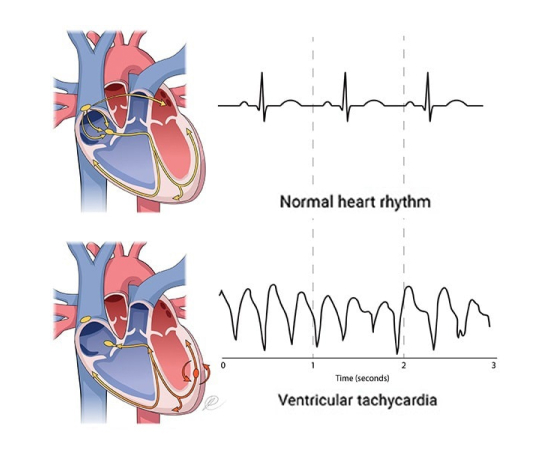Have you felt your heart race like it is running a marathon, even when you are still? This could be a sign of ventricular tachycardia, or VT for short. It is a type of arrhythmia starting in the lower part of your heart and can hamper your blood circulation.
Imagine your heart normally beats 60 to 100 times a minute when at rest. With VT, it jumps to over 120 beats. That is when you might notice odd feelings in your chest, like palpitations, or feel like you might pass out. It is crucial to know what causes this and the signs to watch for. So, let us dive in and understand Ventricular Tachycardia or V-Tach.
V-Tach- Symptoms & Causative Factors
Have your family members or friends undergone ventricular tachycardia ablation in Chennai? They may have experienced V-tach, a heart rhythm issue starting in the ventricles.
It is like an electrical mix-up, making your heart race faster than usual. If VT occurs and leaves quickly, it might scare you with some chest fluttering. But if it persists for over 30 seconds, it can become a serious condition. Your blood pressure can plummet, making you dizzy or faint. Furthermore, it can lead to ventricular fibrillation, a scarier rhythm problem, or even stop your heart.
Knowing all this puts you on the right track to discuss with your doctor about what to do next. Spotting the signs and understanding the reasons behind Ventricular Tachycardia is vital to caring for your heart.
Exploring the Causes of Ventricular Tachycardia
What causes V-tach? Here are some reasons:
- Heart conditions that leave scars and mess up the electrical tracks.
- Genes can play a part, like with a rare kind called CPVT.
- Electrolyte imbalance or using stimulant drugs can increase the odds.
Armed with this knowledge, you are better off knowing how these causes impact your heartbeat.
Structural Heart Disease- A Key Factor in VT
Looking into VT causes is key to understanding the heart diseases that change the heart's structure, such as heart attack or cardiomyopathy. They can damage your heart and create erratic electrical paths that lead to VT.
These issues change how your heart looks and functions, making VT more likely to happen. And do not forget genes can also influence your heart’s rhythm.
Genetic Factors Contributing to Ventricular Tachycardia
Our genes can set the stage for VT. CPVT is one such genetic curveball that makes the heart go haywire with exercise or stress.
Genetic hiccups like long QT syndrome or Brugada syndrome mess with the heart's electric vibe and can lead to VT. Your genetic blueprint is a big deal for VT, so keep it in mind as you manage your heart health.
And remember, the way you live can also sway your heart's health.
Lifestyle and Environmental Risk Factors for VT
Certain choices and things around you can boost your VT risk. For instance:
- Using stimulating drugs like cocaine.
- Having electrolyte imbalance from kidney issues or medications.
- Daily habits and your surroundings that might increase your VT risk.
Knowing about these risks helps you spot when your heart might be offbeat.
Recognising the Symptoms of Ventricular Tachycardia
Worried about VT? Keep an eye out for symptoms like:
- A chest flutter feeling.
- Dizziness from a very fast heart rhythm.
- Chest pain or blacking out if your brain is low on blood.
Paying attention to these signs helps you stay on top of your heart game.
Diagnosing Ventricular Tachycardia- Methods & Tools
An ECG is often the first clue to understanding if you have had a V-tach. A Holter monitor can track your heart’s electric signals for on-and-off symptoms over a few days. Implantable loop recorders are useful for detecting rare instances of abnormal heart rhythms over a long period of time. These gadgets are key in nailing down VT and sorting out your heart care.
Treatment Options for Ventricular Tachycardia
When dealing with ventricular tachycardia (VT), your doctor will first investigate the underlying cause and the severity of the condition to determine the best course of action. They may prescribe medications to steady your heart rhythm or implant an Implantable Cardioverter-Defibrillator (ICD) if you are at risk of sudden cardiac arrest.
In some cases, your doctor may recommend catheter ablation to eliminate problematic areas in your heart if the cause of VT is unknown. It is important to discuss your individual needs with your healthcare provider to create a tailored treatment plan. Staying vigilant and proactive in managing your VT is crucial in preventing further heart complications.
Understanding Potential Complications of VT
If VT is not tackled fast, it can lead to serious issues like Syncope or fainting spells because of inadequate blood flow to your brain. If VT persists, it can flip into ventricular fibrillation and lead to a sudden cardiac arrest.
Getting help immediately is a must to regain a normal rhythm and dodge these big risks.
Preventing and Managing Ventricular Tachycardia
To keep VT in check, you have got to be proactive.
- Change your lifestyle for the better.
- Follow your medication routine to the letter.
- Get regular checkups with your cardiologist.
- Consult your doctor to know if your treatment is working or needs any changes.
- Quit smoking, alcohol intake or anything that triggers a VT.
Smart choices and keeping tabs on your heart can help you manage VT and cut down on big health scares.
Step Forward in Heart Health Management
V-Tach can be life-threatening if left untreated. However, with timely medical help and the latest advances in cardiac treatments, you can avoid such issues. Book an appointment with a reputed electrophysiologist in Chennai and get the right treatment for your symptoms.

